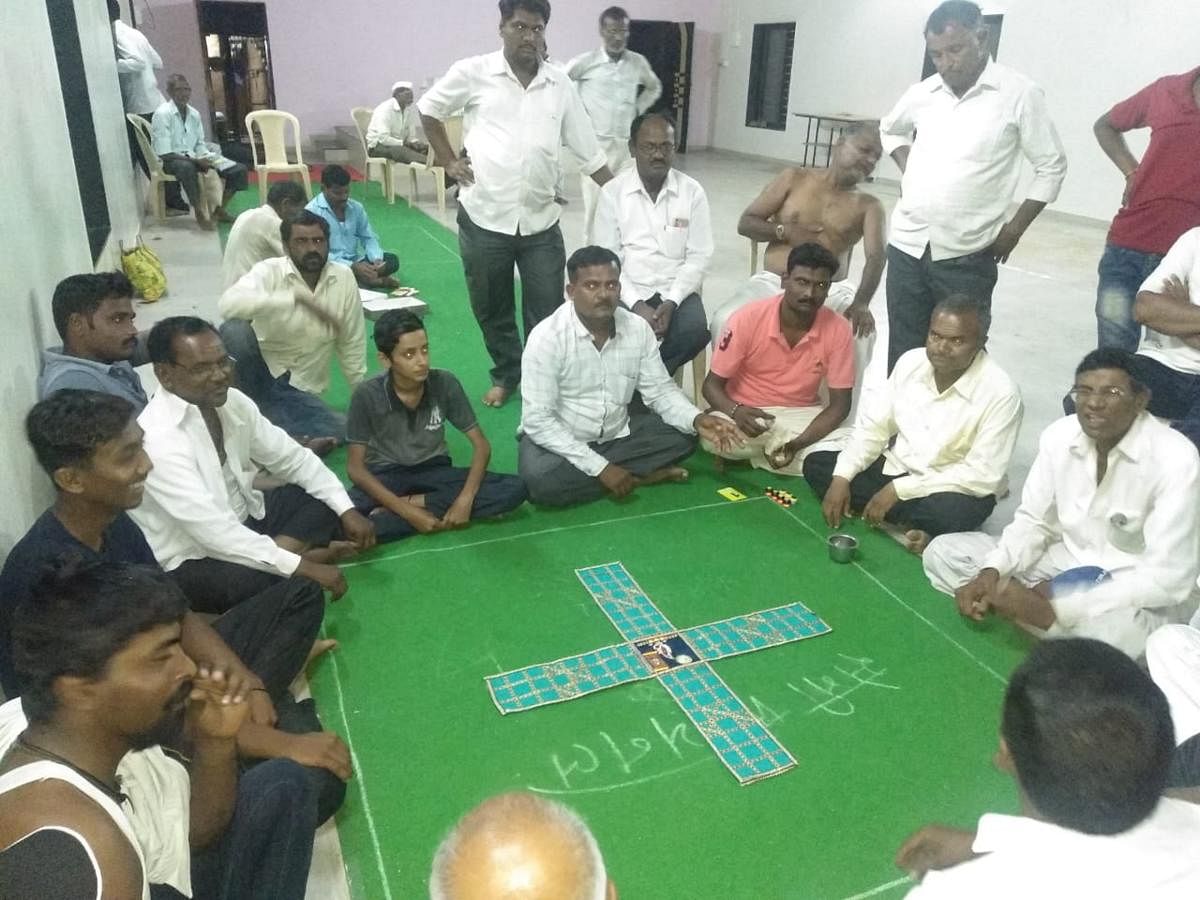Reviving a rural game



Recently, Kulgod village in Mudalgi taluk of Belagavi district wore a festive-like look. Hundreds of people from surrounding villages and also neighbouring states had gathered there. A green carpet had been laid on a huge open space under the protection of a pandal. Numerous columns had been earmarked on the carpet and in those columns laid Pagade boards made of cloth with four arms and joined at the sides of a central big square, which is ‘Home’. On the Pagade boards were pawns and teams were sitting before the boards with cowries tossing in their hands. As the cowrie shells were rolled down, tremendous sounds of panchvees, dasha, bara, chakka, chaari, teeni etc filled the entire area. The people had gathered here to watch the unusual national competition of Pagade, a rural game with an ancient connect.
Every year, Kulgod Tammanna Foundation organises national-level Pagade competition. Competitors from not only Belagavi district but also other parts of the state, and from Maharashtra and Goa participate with great enthusiasm. It is held both in the morning and under special lighting arrangement at night and people, especially rural people, gather in large numbers to enjoy the game. As the crowd of spectators is too large, it is often called as Pagade Jathre or Pagade fair.
Unique style
The game usually starts at 11 pm on the inauguration day. For the next two to three days, several rounds of the game go on all day round. To facilitate the spectators to watch the game, a huge open space in the village is chosen and a pandal is erected there. This space is then divided into 30 to 32 columns where several teams play. Sometimes, the game concludes in just half an hour. At times, the game goes on for five to six hours drawing the attention of an excited crowd.
The credit of revamping the Shri Krishna Parijatha Bayalata and presenting it in a unique style making it relatable to commoners goes to Kulgod Tammanna. There is a beautiful description of the Pagade Aata in the Shri Krishna Parijatha and this is one of the most awaited scenes. These scenes eventually made the Pagade Aata gain popularity in the area and the game came to be known as Parijata Pagade. Earlier, there were hundreds of Pagade teams in the region but now just a handful of them are left.
However, even today, the Pagade competitions are held in several villages in the North Karnataka districts. Though the game is held around the year, it is a special attraction during the Deepavali festival.
“The main aim of organising folk plays like Shri Krishna Parijatha and rural games like Pagade Aata is to save the rich folk art which we have bequeathed from our ancestors,” said Ramesh Koujalgi, president of the foundation. He also said that they have been holding Parijatha Utsav and Pagade Utsav for the past one-and-half decades and has even instituted Pagade Award in the name of Parijatha Tammanna.
So far, the foundation has organised four mega Pagade tournaments which witnessed the participation of hundreds of people cutting across religions and castes.
Mythologically, the dice game has been depicted as a form of gambling. But the dice game played here has not been infected with the ‘gambling virus’. The organisers say that ‘Shakunis’ (antagonists) who hatch plots with ill intentions do not have a place in the present-day tournaments and only those who play ethically are encouraged. That is why the organisers say that the participants must turn themselves into a ‘Dharmaraja’ while playing the game.
The game of life
The ‘Shri Krishna Parijata’ Bayalata presented by Kulgod Tammanna has an exclusive scene on Pagade where he has likened the Pagade board with the human life. He calls the four arms of the board (made of cloth) as Andaja, Pindaja, Udbhija and Shwetaja.
The game is not just limited to the older generation. It is being continued by the younger generation as well. “The popular folk game acts as a medicine to improve concentration and memory power in children. It also involves calculations and so, it helps children to learn mathematics practically,” opine the game promoters.
Recently, a three-day national-level Pagade tournament was held in Kulgod. Around 100 teams had participated in the tournament.
(Translated by Divyashri Mudakavi)
Deccan Herald is on WhatsApp Channels| Join now for Breaking News & Editor's Picks